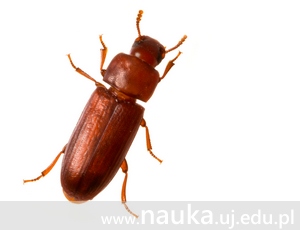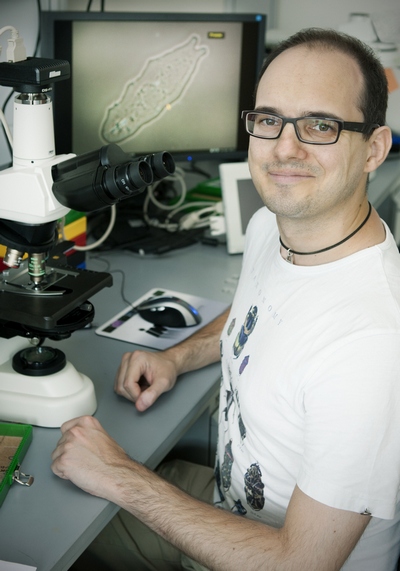
The research conducted at the University of East Anglia in collaboration with the Jagiellonian University brings us closer to solving one of the greatest mysteries of life.
According to recent research by a group of scientists, one of whom is Dr Łukasz Michalczyk from the JU Institute of Zoology, the fact that most organisms on Earth (including humans) require two sexes to reproduce is caused by a series of very important factors. "The basic evolutionary mechanism, known as sexual selection, and its consequence – sexual reproduction – is so overwhelmingly widespread because it increases offspring guarantee not only the right number of offspring, but also the right quality," Dr Michalczyk.
The puzzle of sexes
For decades, biologists have wondered: how is it that natural selection – an inexorable mechanism which mercilessly eliminates even the slightest trace of wastefulness – allows males to even exist? Despite the fact that in most species the male's only contribution to reproduction is sperm, the majority of multicellular organisms on our planet reproduce sexually. In fact, it is so common that we sometimes forget that for millions of years organisms did not reproduce in this way. This is why it is so hard to explain why any species would invest in males when only females are able to produce offspring. Scientists started theorising that the process of sexual selection might be crucial to solving this mystery. However, until now, there was no conclusive evidence for this. The research paper published in the latest issue of Nature may very well be that proof.
Sexual selection – a mode of natural selection in which individuals of the same sex compete to secure mates.
The concept of sexual selection was introduced by Charles Darwin. It provided an explanation for striking colours, intoxicating smells and fancy sounds which help males in their struggle to find a mate and to pass on their genetic material. It is a strong driving force which shapes the world of living organisms.
The filter of sexual selection
"Our research has shown that male competition and selection by females may beneficial to the genetic quality of offspring," says Dr Michalczyk. "It's like a filter that prevents detrimental genetic mutations from spreading through the population. It means that species which reproduce sexually are less likely to become extinct. To put it simply: it's not only about quantity, but also about quality."
Seven years, fifty generations
 Although proving the effectiveness of sexual selection in improving the genetic quality of a population seems simple, in reality the research team led by Professor Matthew Gage had to conduct a series of tests which lasted for ten years. They studied the red flour beetle (Tribolium castaneum), a worldwide pest of stored products.
Although proving the effectiveness of sexual selection in improving the genetic quality of a population seems simple, in reality the research team led by Professor Matthew Gage had to conduct a series of tests which lasted for ten years. They studied the red flour beetle (Tribolium castaneum), a worldwide pest of stored products.
For the first seven years (which equals about fifty generations of red flour beetles), the team bred independent populations of the beetles which differed from one another in the intensity of sexual selection. This intensity varied from 90 males competing for 10 females per generation to absolutely no competition at all – monogamous pair were randomly selected by the researchers. In the final three years, the scientists used the inbreeding technique to see if the populations varied in genetic quality.
"One of the effects of inbreeding is the inbreeding depression: lowered viability and competitiveness of inbred offspring. For centuries, it has been a problem for breeders who wanted to achieve the best possible varieties of plants and animals. However, we used it to reveal detrimental mutations in genomes," said Dr. Michalczyk. The higher fitness after several generations of inbreeding, the better genetic material of the lineage.
The researchers discovered that populations with high intensity of sexual selection were able to endure prolonged inbreeding with a relatively small loss in survivability, while those devoid of sexual selection quickly succumbed to genetic diseases.
Woe to the conquered
Dr Michalczyk explained that the results of the research clearly show how important a factor is sexual selection in health and survivability of a population. It helps lessen the impact of deleterious mutations and increase the quality of genetic material. The male needs to be strong and healthy to defeat his rivals, and being strong and healthy is only possible if his genetic material is superior to that of other males.
Thanks to this simple mechanism, sexual reproduction is a very viable way to produce offspring. "Thus, even though the existence of males is not absolutely necessary, they make species more resilient and less susceptible to environmental stress. Our research helps us solve one of the greatest mysteries of evolution. It may also be useful in endangered species protection programmes. Selecting the right method to increase the population of an endangered species is a key aspect in maintaining the biodiversity of our planet," concludes Dr Michalczyk.
The article Sexual selection protects against extinction was published in Nature on 18 May 2015.
Dr Łukasz Michalczyk is an adjunct academic at the Department of Entomology of the JU Institute of Zoology. He conducts research in the areas of evolutionary biology and integrative taxonomy of tardigrades (for more information click here). He authored nearly 70 articles in journals such as Science, Evolution, and Proceedings of the Royal Society of London.
Red flour beetle: photograph by Martin Taylor.
Dr Łukasz Michalczyk: photograph by Magda Wiśniewska, FNP.
Original text: www.nauka.uj.edu.pl





